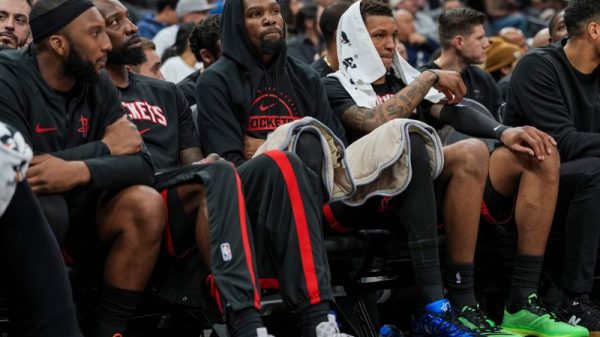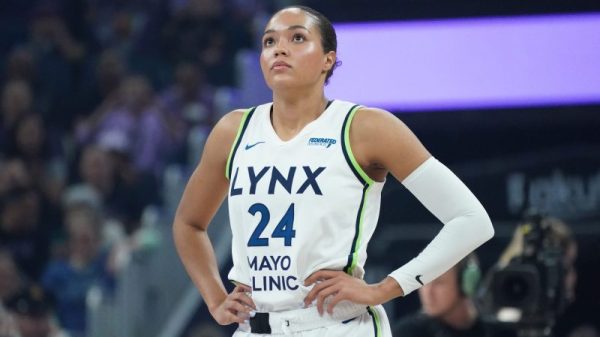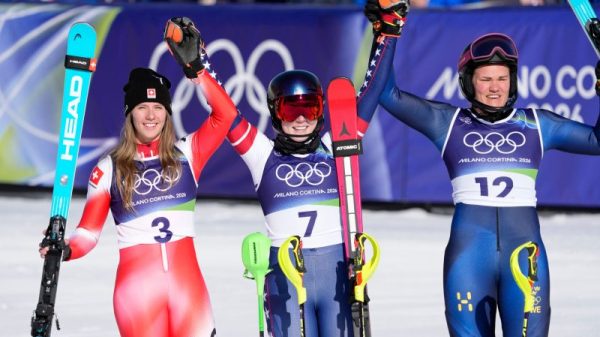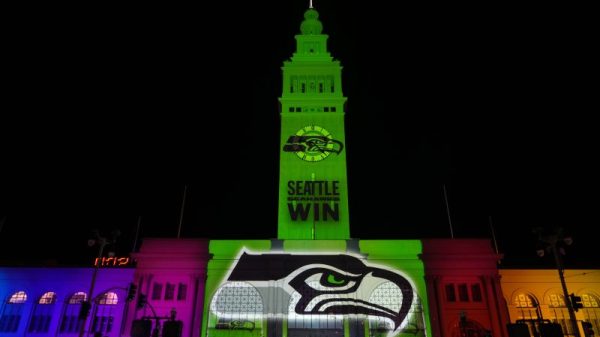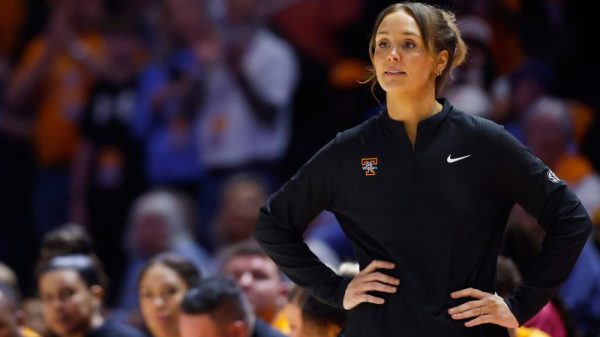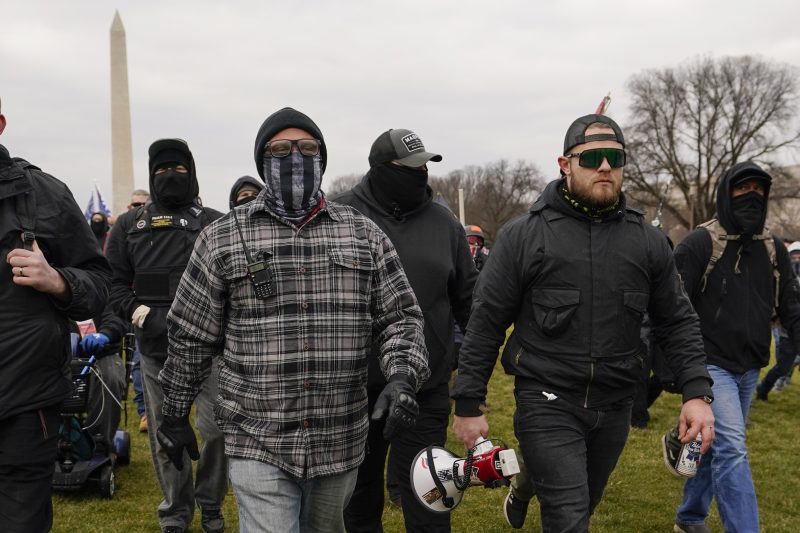Asking an FBI agent to name cereals. Making wild claims of government plots and executions. Near daily, calling for a mistrial.
As the federal seditious conspiracy trial of top members of the Proud Boys group grinds into its third month, attorneys for some of the five men have often turned what the Justice Department sees as a deadly serious proceeding into a farce.
The moves have succeeded at chopping up and slowing down the government’s presentation. They have also appealed to an audience outside the courtroom, where former president Donald Trump and his supporters continue to re-litigate whether the Jan. 6, 2021, Capitol attack was as bad as prosecutors say it was. But the freewheeling questioning of government witnesses by the Proud Boys’ attorneys has also tied the defendants to conspiracy theories about Jan. 6 and exposed some of the far-right group’s ugliest rhetoric and beliefs.
One defense attorney began his opening remarks by thanking “the audience,” prompting an admonition from Judge Timothy J. Kelly, who was nominated to the bench by Trump, to ignore spectators and focus on the jury.
It was one of many rebukes the judge has handed out. “What I won’t do is have you hijack the proceedings with your snide remarks,” Kelly told another defense lawyer two weeks in, after what he called an “absurd” request to delay the trial while she read a book mentioned in the evidence.
Many witnesses have stayed on the stand days longer than planned due to constant objections, sidebars and spats between the defense and the government over lines of questioning. The defense attorneys have closed ranks in response to Kelly’s lectures; when the judge threatened to hold one lawyer in contempt, another stepped in to provide representation.
All these diversions and disagreements, along with a massive amount of evidence to consider, have stretched out a trial expected to take eight weeks into something much longer. The trial entered its 10th week with U.S. prosecutors completing the examination of their 21st and final witness Friday and defense attorneys set to begin calling witnesses next week. By comparison, the entire seditious conspiracy trial against Oath Keepers leader Stewart Rhodes and four others was completed in seven weeks, with 46 witnesses put on by both sides.
What to know about the Proud Boys sedition trial
End of carousel
Longtime Proud Boys leader Henry “Enrique” Tarrio is accused of plotting violence with deputies Joseph Biggs, Ethan Nordean, Dominic Pezzola and Zachary Rehl to keep Trump in power; if convicted at the end of the trial, they face possible decades in prison.
Their defense is that any talk of revolution and war was made in jest; that the Proud Boys had no specific, shared objective; and that the group was surprised by and unprepared for the reality of Jan. 6. “If people are joking, that’s not criminal conspiracy,” Nordean defense attorney Nicholas Smith said while cross-examining one witness.
And so some defense attorneys have tried to make the trial itself seem absurd.
When an FBI agent read from a list of the group’s initiation rites, which includes “engaging in a major conflict for the cause,” Pezzola attorney Stephen Metcalf asked about a different ritual — naming five cereals while getting punched.
“Can you name five cereals?” Metcalf quizzed the agent.
The agent paused, then got out “Wheaties” before the judge sustained an objection from prosecutors.
Sabino Jauregui, representing Tarrio, used cross-examination of one FBI agent to claim “the government is hiding” another FBI agent involved in the case who has not testified. Prosecutors asked for Jauregui to be punished over “an affront to the dignity of this proceeding.”
Kelly gave a warning, telling the “skilled lawyers” on the defense that they should know better than to repeatedly say “things that everyone understands have no place before the jury.”
Halfway through the trial, several defendants demanded that Trump be called to testify, a move all judges weighing similar requests have rejected as irrelevant.
Some of the Proud Boys’ jokes in messages shown to jurors were at the expense of racial and sexual minorities, and much of their anger was directed at police. But some attempts by their attorneys to neutralize or explain that language have backfired.
Norm Pattis, representing Biggs, appeared to go out of his way to elicit on cross-examination that an FBI special agent offering key testimony was gay — asking where he met his life partner and whether he was in court. The attorney seemed to anticipate that prosecutors would discuss the Proud Boys’ homophobic remarks and wanted to raise questions about the agent’s objectivity.
At another point, Pattis challenged star U.S. witness Jeremy Bertino — a Proud Boys leader who pleaded guilty to seditious conspiracy and entered a federal witness protection program — to produce a single example of his claim that the Proud Boys’ chats included Nazi sympathizers.
The government used the opportunity to reveal to jurors that some Proud Boys were concerned about “Nazi offshoots” or “National socialist” members, including one Bertino said wore a “6MWE” shirt, for “6 million weren’t enough.” An estimated 6 million European Jewish people were killed during the Holocaust.
Pattis, a veteran litigator whose clients include Infowars founder Alex Jones, and Roger Roots, a former Montana Libertarian candidate who with Metcalf represents Pezzola, at times have seemed to defend some of the Proud Boys’ views and blame police for the violence of Jan. 6 — arguments that have not gained traction in hundreds of prosecutions and dozens of trials before jurors in Washington.
Pattis suggested the Proud Boys were right to venerate Western culture, contrasting the system of having a trial with a jury to sitting “in East Gitche Gumee, throwing darts at a Ouija board.” (Gitche Gumee was Henry Wadsworth Longfellow’s transcription of a Native American name for Lake Superior in his epic poem “The Song of Hiawatha.”)
Roots grilled a Capitol Police leader on the death of Ashli Babbitt, who was fatally shot by a police officer inside the Capitol on Jan. 6, spurring criticism by some on the right who feel the officer acted inappropriately. (The Capitol Police officer who shot Babbitt as she climbed through a window into the House chamber was cleared of wrongdoing.) Later, after a Florida entrepreneur testified that he had written a hypothetical plan for occupying federal buildings that found its way to Tarrio, Roots filed a mistrial motion arguing that the “deep state neocon establishment and intelligence community” had “frame[d]” the defendants because the witness did some work for the U.S. military while in college.
Kelly responded that the motion was “unconvincing.”
When U.S. Capitol Police officer Mark Ode testified that Pezzola stole his shield while the officer was pinned down by other rioters, blinded with pepper spray and strangled with his own helmet strap, Pattis asked if he was lying to hide that he let the shield go.
Some of the attorneys have tried to distance themselves from the tactics of others. When Tarrio defense attorney Nayib Hassan cross-examined Ode, he said only, “Thank you for your service and for your bravery that day.” Smith said in his opening statement that Nordean’s defense would not veer into politics or claims that Jan. 6 was an FBI plot; when Roots attempted to ask an FBI agent about pipe bombs planted that day, Smith successfully objected.
“I don’t care about the politics of the case,” Metcalf said in front of the jury at one point, adding, “There are conflicting issues arising among defense counsel.”
Of course, defense strategies — and temperaments — often diverge in trials with multiple defendants. They also may face different evidence — when Pezzola was taking the officer’s shield, Tarrio was watching the riot on television from a Baltimore hotel. And for those who think a conviction is likely, appealing to the public rather than the jury makes some sense, said Stephen A. Saltzburg, a George Washington University law professor and former Justice Department lawyer.
“If you think you’re going down — that you’re going to be found guilty, and you’re pretty sure about that, then your audience may well be people who could take up your cause after you’re convicted,” Saltzburg said. Trump, he noted, has vowed to pardon Jan. 6 defendants if reelected president in 2024.
Attorneys whose clients are part of political movements have long worked to legitimize the beliefs of people charged with political crimes or violence, said Joseph Lowndes, a professor of political science at the University of Oregon and a scholar of right-wing politics.
“Saying my client was manipulated by people in Trump’s orbit or just got swept up in the thing is probably the most effective way to appeal to a heavily Democratic-leaning jury in Washington,” Lowndes said. “But that’s a missed opportunity to sway public opinion to a worldview to which your client is deeply committed.”
The Proud Boys’ defense attorneys have at times seemed keenly aware of the show they are putting on — and its inflated run time. Pattis at once point compared the trial to “Gilligan’s Island.”
“It was supposed to be a three-hour tour, and people were stranded together for an infinite period while they worked out their interpersonal difficulties,” he joked.
The next day, asked if he would speed things along by stipulating to the authenticity of some of the evidence seized by the government, Pattis declined.






